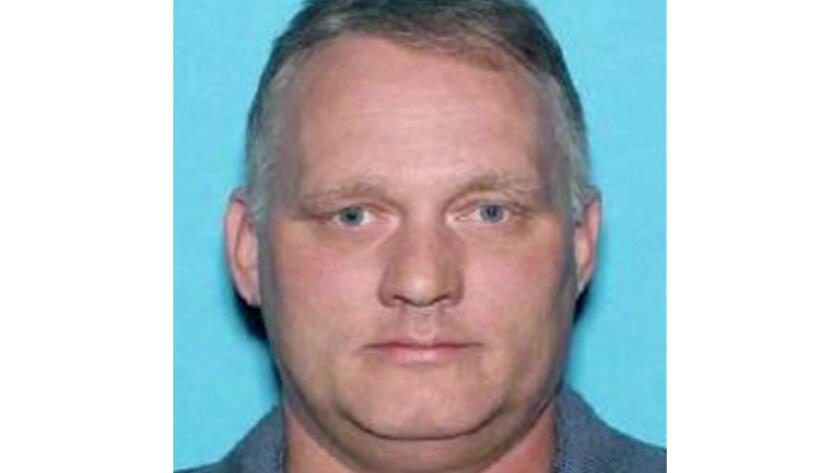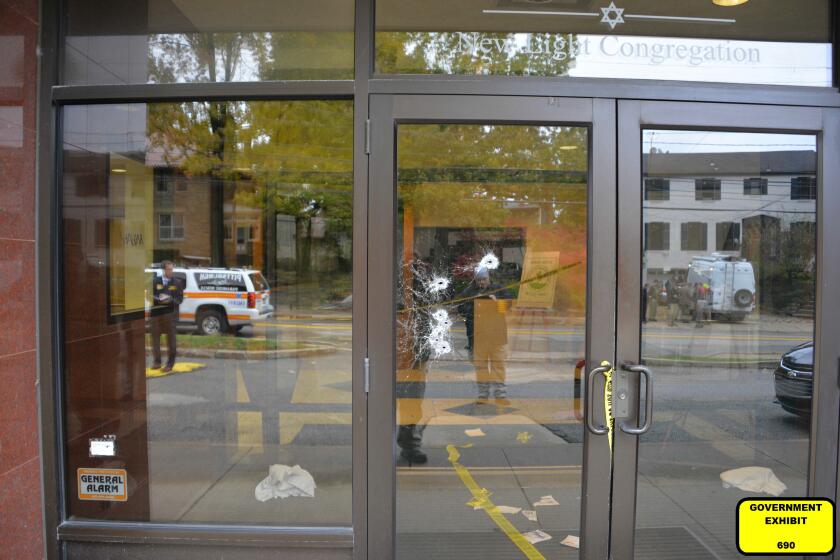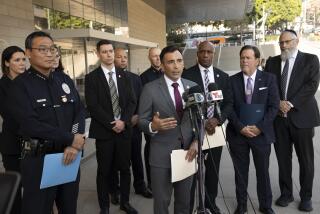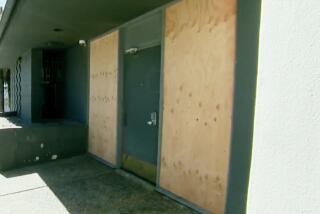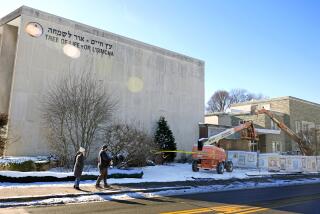Pittsburgh synagogue gunman to be sentenced to death in nation’s deadliest attack on Jews
- Share via
Jury recommends death sentence for the gunman who killed 11 in attack on Pittsburgh synagogue, the nation’s deadliest attack on Jews.
- Share via
PITTSBURGH — The gunman who stormed a synagogue in the heart of Pittsburgh’s Jewish community and killed 11 worshipers will be sentenced to death for perpetrating the deadliest antisemitic attack in U.S. history, a jury decided Wednesday.
Robert Bowers spewed hatred of Jews and espoused white supremacist beliefs online before methodically planning and carrying out the 2018 massacre at the Tree of Life synagogue, where members of three congregations had gathered for Sabbath worship and study. Bowers, a truck driver from suburban Baldwin, Pa., also wounded two worshipers and five responding police officers.
The same federal jury that convicted the 50-year-old Bowers on 63 criminal counts recommended that he be put to death for an attack whose impacts continue to reverberate nearly five years later. He showed little reaction as the sentence was announced, briefly acknowledging his legal team and family as he was led from the courtroom. A judge will formally impose the sentence later.
Jurors were unanimous in finding that Bowers’ attack was motivated by his hatred of Jews and that he chose Tree of Life for its location in one of the largest and most historic Jewish communities in the U.S. so that he could “maximize the devastation, amplify the harm of his crimes, and instill fear within the local, national, and international Jewish communities.” They also found that Bowers lacked remorse.
At a news conference after the verdict, attack survivor Rabbi Jeffrey Myers of the Tree of Life Congregation noted that Wednesday was a “day of love” on the Hebrew calendar.
“I don’t believe in coincidences. Today we received an immense embrace from the halls of justice,” he said, taking the jury’s decision as an affirmation that “we have the right to practice our Judaism and no one will ever take that right away from us.”
The family of 97-year-old Rose Mallinger, who was killed in the attack, and her daughter, Andrea Wedner, who was shot and wounded, thanked the jurors and said “a measure of justice has been served.”
Bowers’ lead defense attorney, Judy Clarke, declined to comment.
The verdict came after a lengthy trial in which jurors heard in chilling detail how Bowers reloaded at least twice, stepped over the bloodied bodies of his victims to look for more people to shoot, and surrendered only when he ran out of ammunition. In the sentencing phase, grieving family members told the jury about the lives that Bowers took — elderly people and intellectually disabled brothers among them — and the unrelenting pain of their loss. Survivors testified about their own lasting pain, both physical and emotional.
A gunman who killed 11 worshipers at a Pittsburgh synagogue ranted incessantly on social media about his hatred of Jews before the 2018 attack.
Through it all, Bowers showed little reaction to the proceeding that would decide his fate — typically looking down at papers or screens at the defense table. He even told a psychiatrist that he thought the trial was helping to spread his antisemitic message.
It was the first federal death sentence imposed during the presidency of Joe Biden, whose 2020 campaign included a pledge to end capital punishment. Biden’s Justice Department has placed a moratorium on federal executions and has declined to authorize the death penalty in hundreds of new cases in which it could apply. But federal prosecutors said death was the appropriate punishment for Bowers, citing the vulnerability of his mainly elderly victims and his hate-based targeting of a religious community.
“While today’s unanimous decision by a federal jury in Pittsburgh is an important act of accountability, it will never bring back the 11 people who lost their lives or heal the grief and trauma of their loved ones,” said White House spokeswoman Olivia Dalton, adding that Biden was “praying for the victims’ families, and for all those in the broader community who have been so deeply impacted by this tragedy.”
Most victims’ families said Bowers should die for his crimes.
Jury deliberations begin in the trial of a man who in 2018 killed 11 worshippers at a Pittsburgh synagogue in the nation’s deadliest attack on Jews.
Bowers’ lawyers never contested his guilt, focusing their efforts on trying to save his life. They presented evidence of a horrific childhood marked by trauma and neglect. They also claimed Bowers had severe, untreated mental illness, saying he killed out of a delusional belief that Jews were helping to cause a genocide of white people. The defense argued that schizophrenia and brain abnormalities made Bowers more susceptible to being influenced by the extremist content he found online.
The prosecution disputed that mental illness had anything to do with it, saying Bowers knew exactly what he was doing when he opened fire on terrified congregants with an AR-15 rifle and other weapons.
Bowers blasted his way into Tree of Life on Oct. 27, 2018, and killed members of the Dor Hadash, New Light and Tree of Life congregations, which shared the synagogue building.
The deceased victims were Joyce Fienberg, 75; Richard Gottfried, 65; Rose Mallinger, 97; Dr. Jerry Rabinowitz, 66; brothers David Rosenthal, 54, and Cecil Rosenthal, 59; Bernice Simon, 84, and her husband, Sylvan Simon, 86; Dan Stein, 71; Melvin Wax, 87; and Irving Younger, 69.
Anti-Jewish incidents hit a record high in U.S. and California in 2022, the Anti-Defamation League says. Some harassers referenced Ye’s antisemitic remarks.
Bowers, who traded gunfire with officers and was shot three times, told police at the scene that “all these Jews need to die,” according to testimony. Ahead of the attack, he posted, liked or shared a stream of virulently antisemitic content on Gab, a social media platform popular with the far right. He has expressed no remorse for the killings, telling mental health experts he saw himself as a soldier in a race war, took pride in the attack and wished he had shot more people.
Martin Gaynor, a Dor Hadash member and attack survivor, said Wednesday that antisemitism is on the rise. All those affected by the massacre “know where this leads,” he said, “a dark path that descends into hate, violence and destruction. This is not only bad for Jews, it’s bad for our entire country. If we permit hate to enter our hearts, we ourselves are diminished.”
More to Read
Sign up for Essential California
The most important California stories and recommendations in your inbox every morning.
You may occasionally receive promotional content from the Los Angeles Times.
